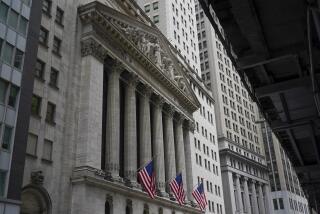Bond Issues Soar as IPOs, Mergers Sink in 1st Quarter
- Share via
The first quarter was one of the toughest times in years for companies to raise equity capital or complete a merger amid the stock market’s plunge.
But for some cash-needy companies, there was another option: load up with bond debt. And investors were happy to oblige, making the quarter a record for bond issuance.
The figures from Wall Street tell two very different tales:
* The number of initial public stock offerings that came to market totaled just 36, the smallest number for any quarter since the early 1990s and down from 119 in the first quarter of 2000, according to data tracker Thomson Financial.
Money raised via IPOs totaled $8.8 billion in the quarter, about half the $15.7 billion of a year ago. This year’s first-quarter total was boosted by huge deals from KPMG Consulting and Agere Systems.
Similarly, money raised in secondary stock offerings--new shares sold by already public companies--dropped to $17.9 billion in 77 deals in the quarter, compared with $46.9 billion raised in 155 deals the same period last year.
* While the equity side of Wall Street was in drought, the bond side was in a boom as yields slumped, in part because of three Federal Reserve interest rate cuts.
Investment-grade corporate bond issuance soared to a record $202 billion in nearly 800 issues, compared with $121 billion in the first quarter of 2000, Thomson Financial said.
Junk bond offerings--debt sold by higher-risk companies--also surged: Nearly $25 billion worth of junk bonds were issued by 71 companies, up from $4.3 billion in deals in the fourth quarter.
For many younger companies, however, the bond market is not an option. More of those firms risk being starved for capital this year if investors’ reluctance to buy new equity continues.
That, in turn, would be a further blow to an already slowing economy because companies would lack the wherewithal to finance growth, experts warned.
“Many companies have been frozen out of the capital markets this year. When that happens, companies hunker down. They stop growing, they lay off people and try to get costs down,” said Steve Wood, economist at FinancialOxygen.com, a Walnut Creek-based business Web site.
Wood pointed out that the new climate is a complete turnaround from recent years, when so much money was chasing investment deals.
“In recent years, we’ve had money flowing freely, but with the economy slowing, investors are saying, ‘Wait a minute,’ ” he said. He predicted the market for raising capital won’t improve until later this year.
Not surprisingly, the first few months of the year have been especially troubling for technology companies.
Silicon Valley firms received $2.7 billion through the sale of stock and other securities through March 15, down dramatically from $14.1 billion in the first quarter of 2000, according Thomson Financial.
As stocks have plunged, so too have merger deals nationwide--many of which had been financed with stock in recent years.
The value of U.S. mergers announced in the first quarter slid to $202 billion in 1,780 deals, compared with $561 billion in 3,056 mergers in the first quarter of 2000, Thomson Financial said.
This quarter was the lowest in terms of the dollar value of deals since the third quarter of 1997.
Though the bond market was a major bright spot for Wall Street in the quarter, it also raised the specter of more companies digging themselves deeper into debt in a slowing economy.
“There is some concern about the overall level of corporate debt” and credit quality, said John Puchalla, a senior economist at bond-rating firm Moody’s Investors Service in New York.
But much of the bond issuance this year has been to refinance older debt, he said. That can improve a company’s balance sheet and thus its prospects for survival in a tough economy.
What’s more, the bond boom--especially investors’ willingness to buy junk debt--suggests there is an underlying optimism about the U.S. economy’s ability to rebound later this year, Puchalla said.
“It does suggest . . . that maybe by the middle of this year, we’ll see some improvement in corporate earnings and put this downturn behind us,” he said.
More to Read
Inside the business of entertainment
The Wide Shot brings you news, analysis and insights on everything from streaming wars to production — and what it all means for the future.
You may occasionally receive promotional content from the Los Angeles Times.










